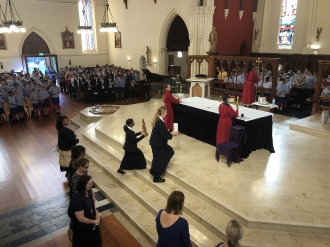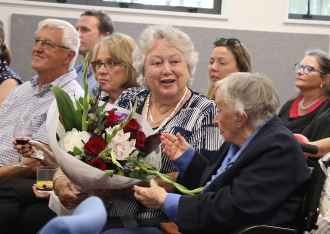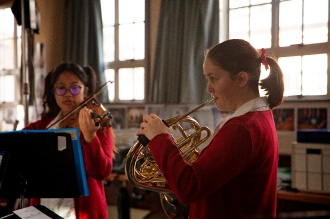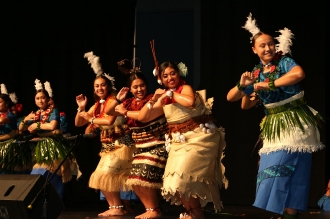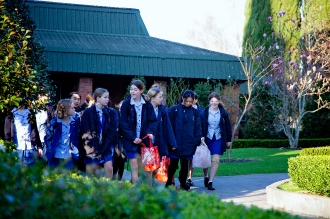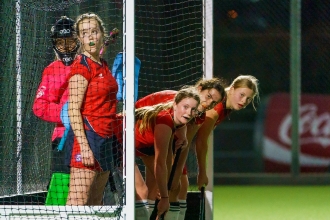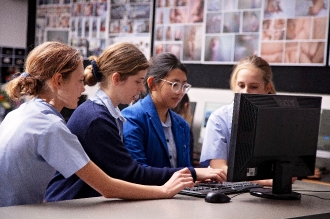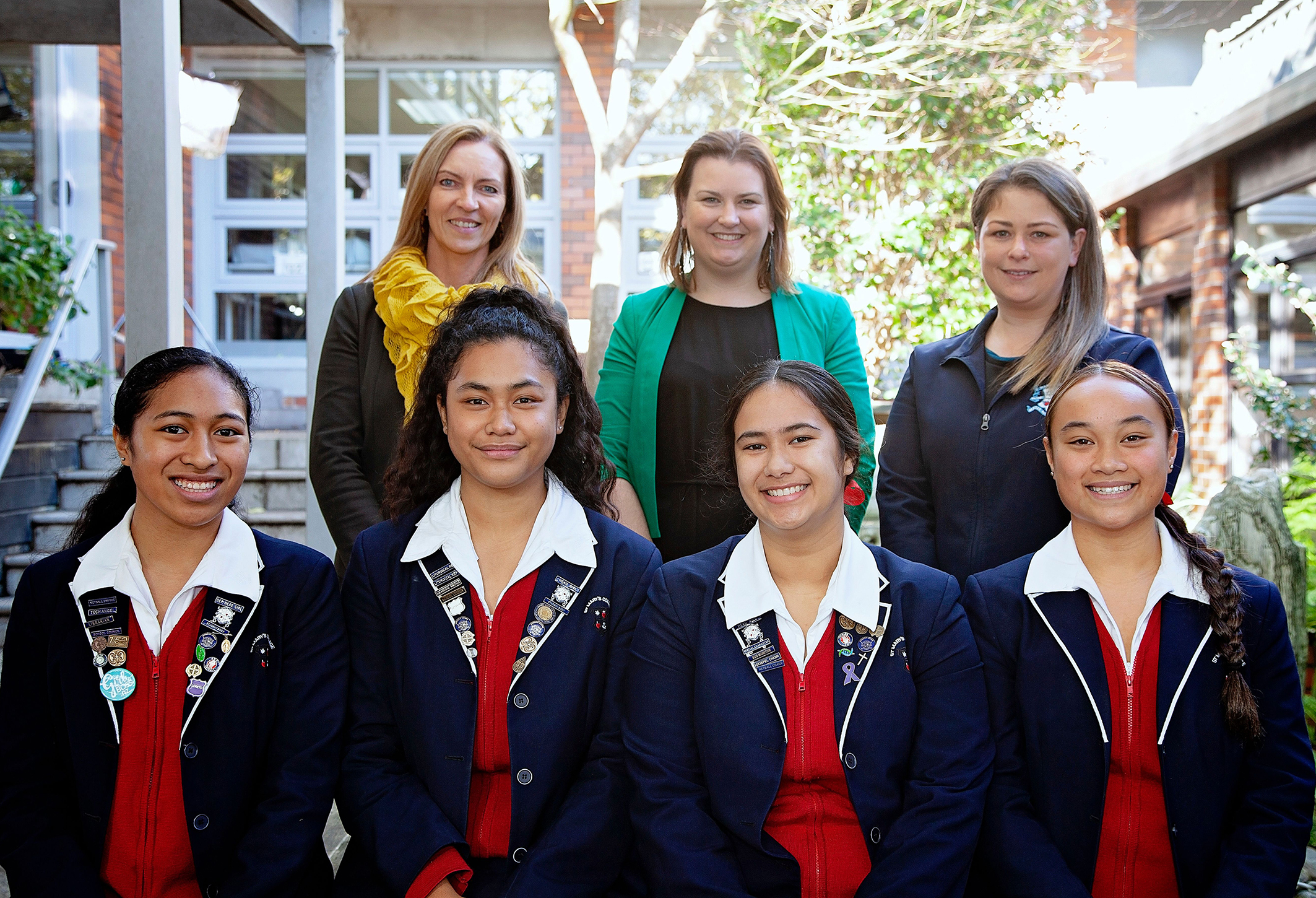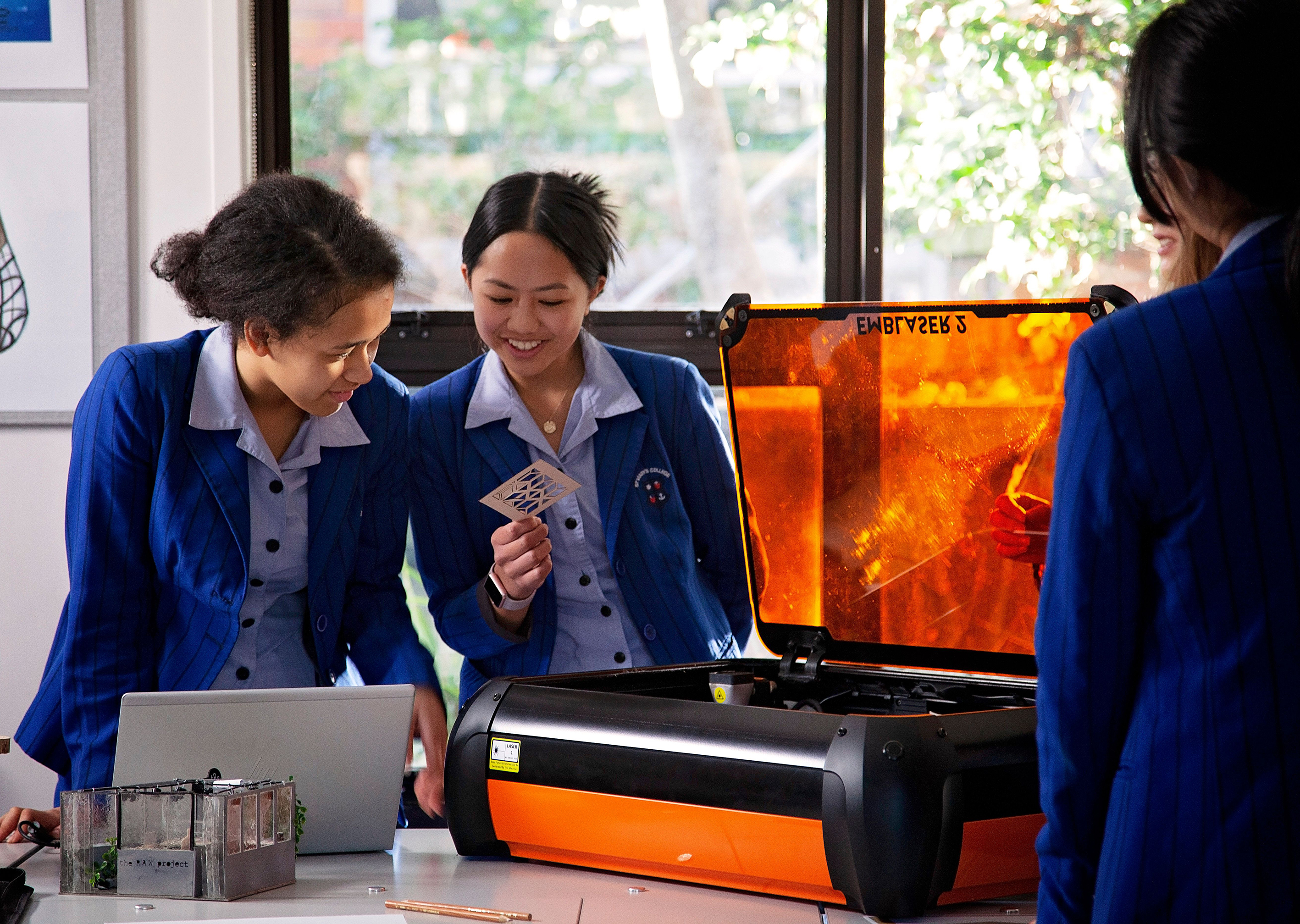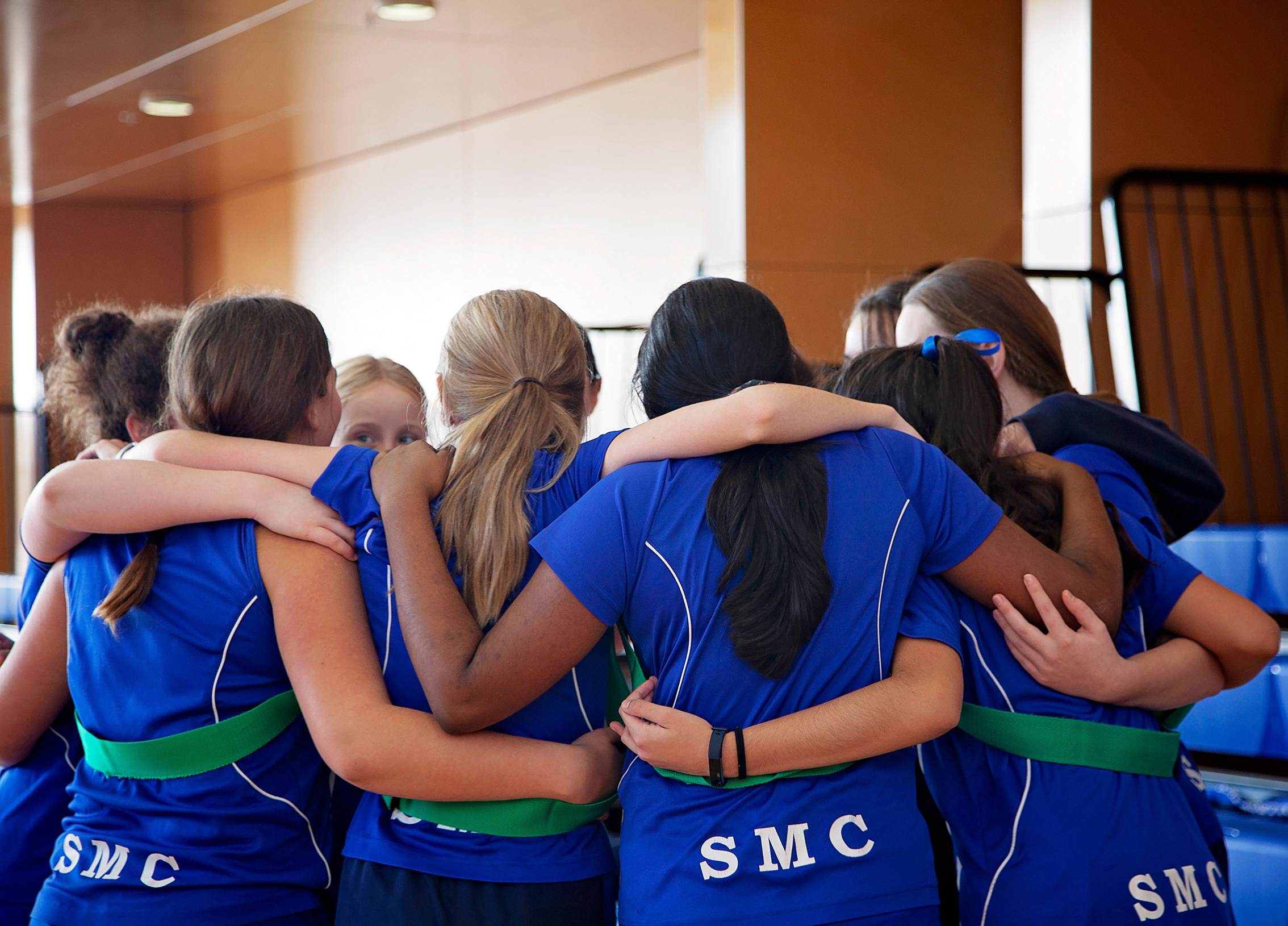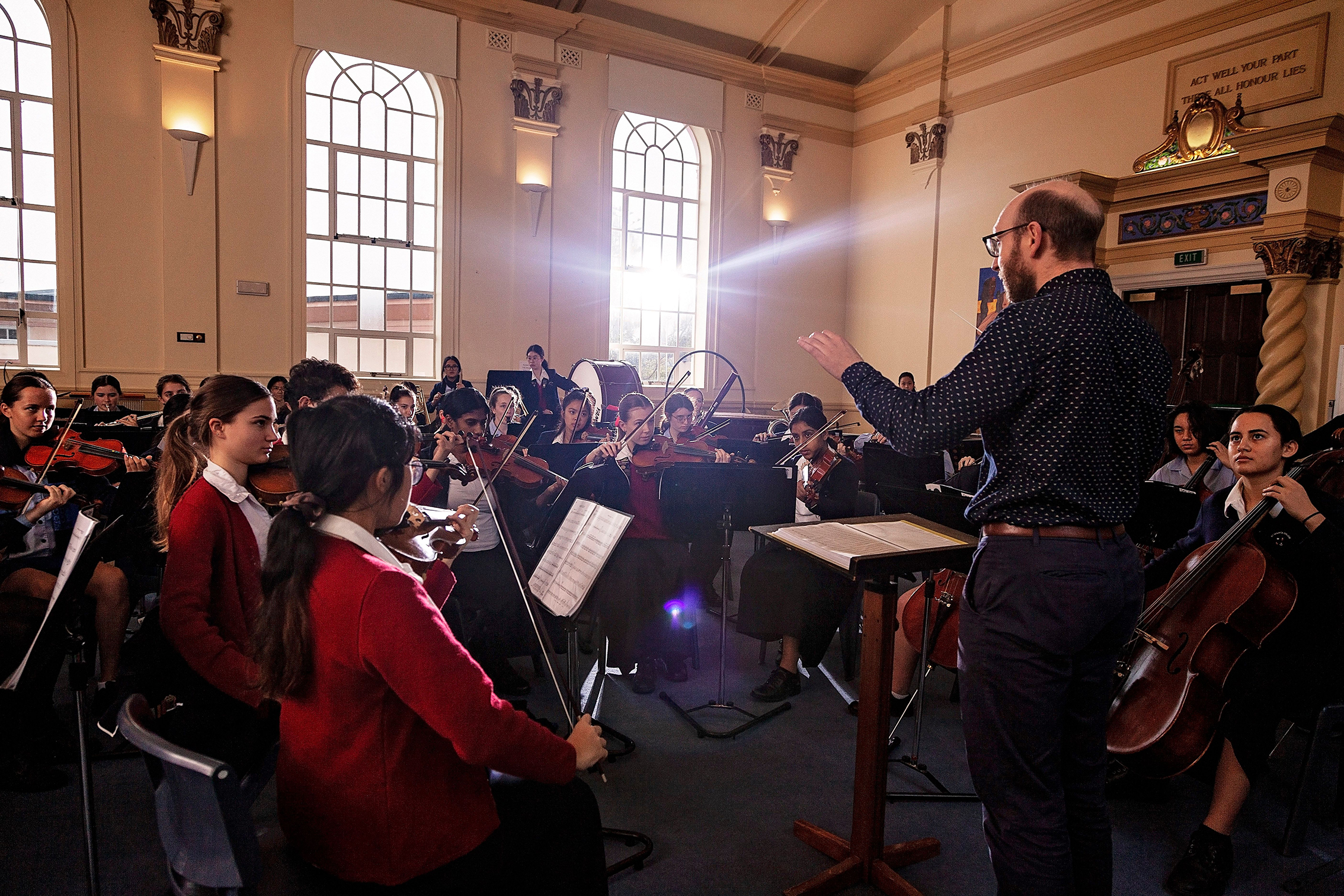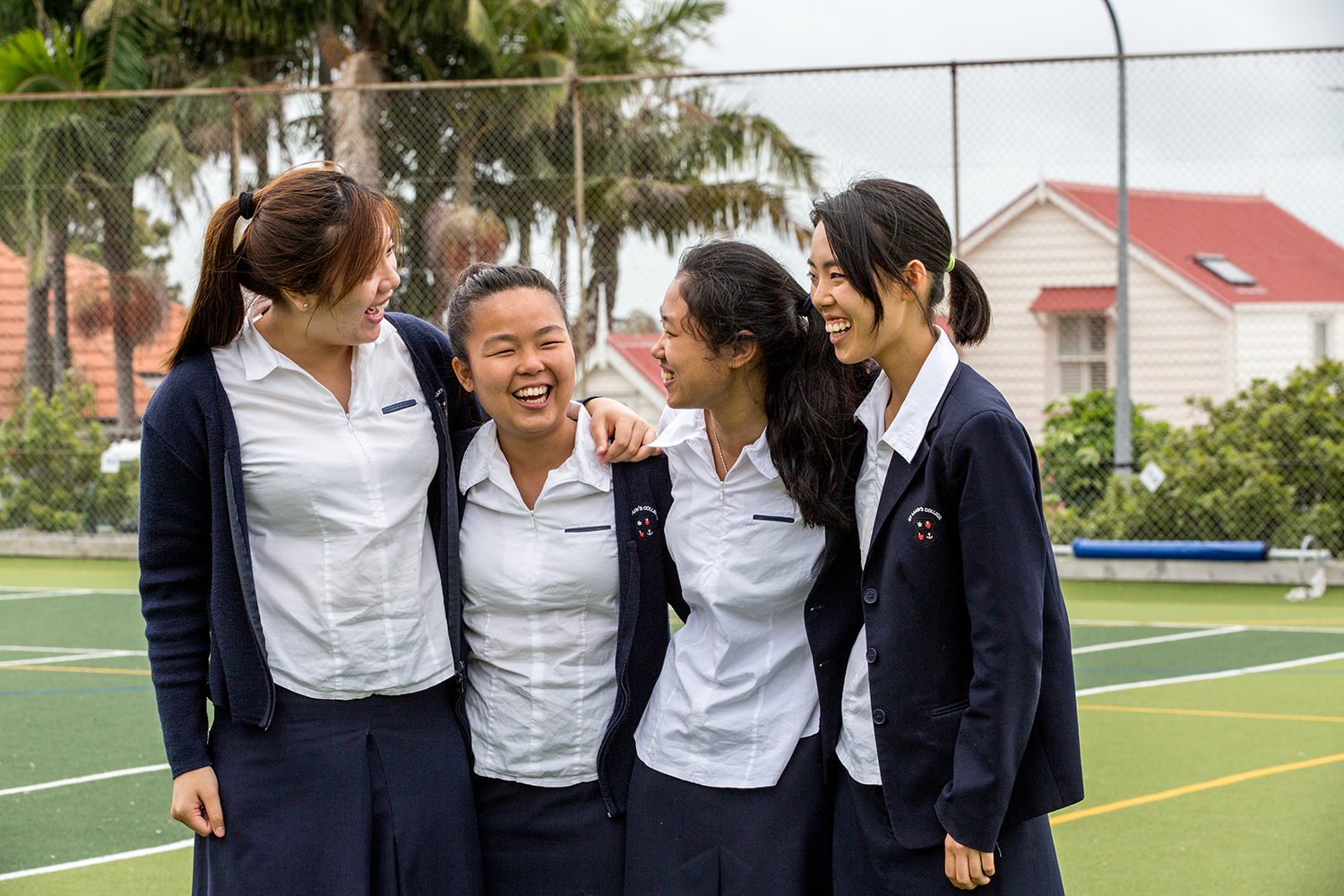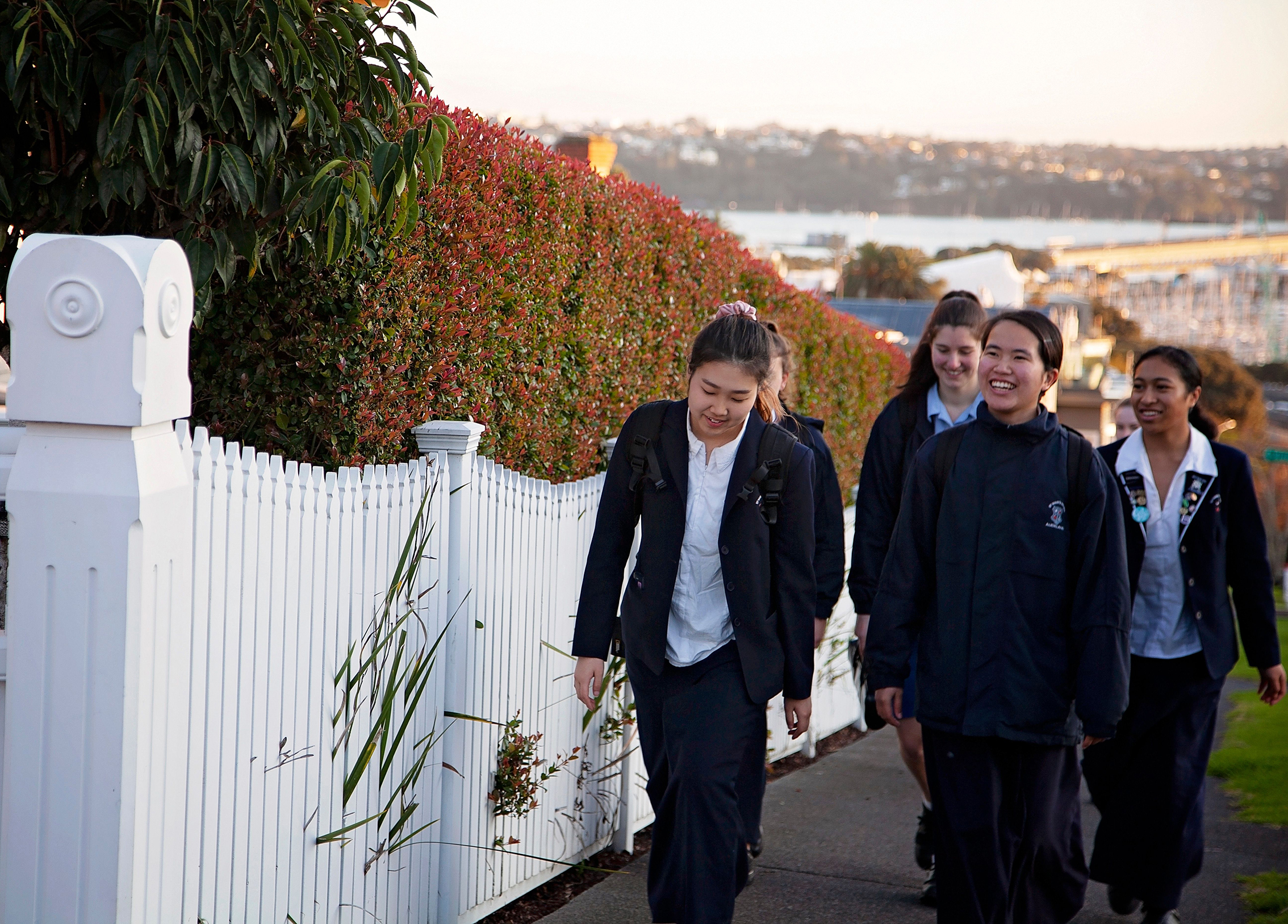News Feeds
-
175th Celebrations at St. Mary's College
2025 is the 175th year of St. Mary’s College. As one of the oldest girls school in New Zealand,...
-
2024 NCEA Results
We are again very proud of the academic results achieved by our students in 2024. NZQA data shows...
-
2026 Enrolments
All the information about enrolment can be found here Should you have an enrolment enquiry, please...
-
Alumni on Facebook
Feeling nostalgic? Want to reconnect with old classmates or teachers and relive moments from your...
-
Bounce Back 4 Syria
ReliefAid is a kiwi charity delivering emergency aid to people affected by conflict. Working in...
-
MB Development
The Mother Benedict Block (MB) refurbishment is now complete. It is great to see all the spaces...
-
OPEN DAY 2025
We invite you to join us for our annual OPEN DAY on Thursday 6 March 2025. This is a wonderful...
-
St Mary's College Video
We are pleased to present our St Mary's College promotional video. Please click below to check out...
| Faculty Leader Technology | Mavis Thorpy | DTG & Junior Tech |
| Teachers | Elena Grant | Junior Tech & FID |
| Misty Lang | FID | |
| Paul Enticott |
Future-focused digital era
Globalisation and technological change are two key features that are changing and shaping our lives. To participate in this future focused digital era, students will need to adapt to change and think critically and creatively. They will need to be resilient, work collaboratively, to solve problems and share ideas and feedback. In Technology, students use project management tools to plan, design, monitor, test and report on their outcome.
New Zealand's future relies on encouraging young New Zealanders to pursue careers with a technological focus. Technology education not only gives all students a level of technological literacy but also provides senior secondary students with an educational foundation for technology-related careers.
Technology in the New Zealand curriculum is a dynamic and future-focused framework for teaching and learning in technology. It gives students challenging and exciting opportunities to build their skills and knowledge as they develop a range of outcomes through technological practice. They bring together practical and intellectual resources in creative and informed ways to engage with the many technological challenges of today's world and of those in the future.
Junior Technology
The junior Technology programme at St Mary’s College covers a range of technological areas such as Materials Technology, Design and Visual Communication and Digital Technologies where students learn DDDO (Developing and Designing a Digital Outcome) and CT (Computational Thinking). As well as creating and producing student-orientated technological outcomes, the students learn vital skills such as communication, creative thinking, problem-solving, collaborative learning and self management.
Diverse and multi-skilled
As Technology is such a diverse and multi-skilled subject it is easy to incorporate the New Zealand curriculum into our learning experiences. Technology has natural and fluid relationships with other STEM subjects such as the Sciences, Engineering, Mathematics and the Arts.
Design and creation
Current Year 7 and 8 projects incorporate a range of technological areas through creating soft toys for Materials Technology and designing and producing a story using Photoshop and Scratch programming for DDDO and CT. Year 9 spend time in the individual technological areas with 3D modelling, desktop publishing, robotics and creating unique bag designs for a stakeholder.
Choosing a project
Year 10 students can choose an option subject from:
- Design and Visual Communication, where the focus is on graphic, product and spatial design
- Materials Technology, where students explore ways to apply design to materials, research elements and principles of design, study designers’ work and explore and develop a product suitable for interior design, or
- Digital Technologies, where students focus on DDDO and CT. Students will undertake project management and future problem solving skills to develop creative solutions that link the end user with the product or innovation, e.g. e-publications, media design using 3D printing, websites and robotics.
Senior Subjects (Year 11 to 13)
Digital Technologies
The course in Digital Technologies aims to undertake technological practice in order to develop and implement a digital technology based solution. Students will engage in the process of developing a brief, solution design, production and evaluation. They will explore the design and production process as applied to their own creative project. Digital skills enable students to participate in a future knowledge society. Students develop original digital media outcomes using project management skills. They will develop skills in computer graphics, e-publications, animation, web design, and film production.
Design and Visual Communication
Design and Visual Communication is an NCEA course focused on product, spatial and graphic design for Years 11, 12 and 13. One or two major projects are completed throughout the year for internal assessment and a selection of work will be used for the external assessments at the end of the year.
Students will gain experience in digital and hand sketching, rendering, CAD and physical model making. They will expand on their visual literacy abilities by exploring a variety of technical drawing skills that will be developed throughout the course. This subject is for students who have a flair for design and attention to detail. It will also appeal to those who enjoy the challenges of critical thinking and problem solving when developing products, visuals and spaces for people.
Computer Science Coding
Computer Science Coding enables students to develop skills and knowledge of tools and techniques in the areas of digital media and computer programming. Students will apply their knowledge and skills as they engage in technological practice to develop their own computer program, game and database projects.
Fashion and Interior Design
This programme is offered to Years 11, 12 and 13. Students have the option of working with textiles in a fashion or interior design context. The focus is on the design process of planning, brief development, modelling and prototyping. Students are encouraged to research into wider aspects of technological processes such as sustainable production methods and social impacts. Projects involve evaluating their own solutions in response to needs and opportunities. Students are supported to develop the skills needed to achieve quality outcomes. This course is a good foundation for a Bachelor of Design degree.
Taking ownership of learning
We believe it is important for students to take ownership of their learning and we aim to provide many opportunities for students to use critical thinking to make personal decisions and individualise their projects within an authentic context.
Social Sciences Staff
| Faculty Leader | Eleanor Rattray | Geography & Junior Social Studies |
| Assistant Head of Faculty | Penny Olson | History & Junior Social Studies |
| Teachers | Monique Wing | |
| Charlotte Murray | GATEWAY & Junior Social Studies | |
| Christopher Smith | Junior Social Studies | |
| Janet Mackay | ||
| Aneta Dezoete | Gateway | |
| Ken Lim | ||
| Renee McGregor |
History
Kia whakatōmuri te haere whakamua
My past is my present is my future. I walk backwards into the future with my eyes fixed on my past.
History provides a framework that gives an insight into the social, economic and political issues shaping the world today. Through studying History, students think critically about the construction of historical knowledge and the significance of past events for them in the present day.
Enhancing skills through study
This subject enhances critical thinking, writing and research skills, as well as preparing students for informed and active citizenship in a changing world.
Topics studied:
| Level 1: |
| African American Civil Rights in USA from 1954-1970 |
| The Mau Movement in Samoa |
| A New Zealand history event of their choice |
| Level 2: |
| Protests from the 20th Century |
| The Holocaust |
| The Salem Witch Trials (1692) |
| Level 3: |
| The French Revolution |
| Te Tiriti O Waitangi |
| A unit focused on historical source interpretation (context changes each year) |
| Students may have the opportunity to participate in Scholarship Exams |
Geography
“Geography is a great adventure with a purpose.” – Michael Palin.
Geography involves learning about the complex relationships between people and places and how they impact communities and environments.
Geography is a science. Students will learn that natural processes create unique environments and natural features such as the Amazon Basin and New Zealand’s beaches. Through studying extreme natural events such as the Indian Ocean Tsunami, they will see how nature can also be destructive and deadly.
Geography is also a social science, one in which students analyse interactions between humans and nature. Aspects of this include analysing perspectives around geographic issues, understanding patterns of global health, and development issues such as malaria, fair pay for coffee farmers, and resource distribution. Students study places such as Norway, and Samoa to understand how the environment you live in can make you rich or poor, healthy or sick.
Field work makes geography unique. Students have the opportunity to conduct research on trips to Waiheke, around Auckland, and to Omaha and Rotorua.
“There has never been a better or more important time to study geography. Interest in issues like climate change, migration, environmental degradation and social cohesion means geography is one of the most relevant courses you could choose to study.” – Adapted from the National Geographic Society, 2012
Topics Studied:
| Level 1: |
| Boxing Day Tsunami |
| New Zealand's Population Structure |
| The Global Pattern and Impacts of Malaria |
| Geographic Research into Tourist Facilities on Waiheke Island |
| Perspectives on the use of 1080 Poison to Control Possums |
| Level 2: |
| The Amazon Basin |
| Differences in Development between Samoa and Norway |
| The Global Pattern and Impacts of Coffee Production |
| Geographic Research into the Soundscapes of Auckland |
| Perspectives on Freedom Camping in New Zealand |
| Level 3: |
| Geographic Research into the Coastal Processes that operate at Omaha Beach and Matheson's Bay |
| Tourism Development in Rotorua |
| Perspectives on Dairying and Fresh Water Management in New Zealand |
| Global Patterns of Global Health, Resource Distribution and / or Environmental Degradation (Student choice) |
| Students May also have the opportunity to participate in Scholarship Exams |
Senior Social Studies
Senior Social Studies is taught at Level 3 only and is a University Entrance subject. Students study social issues from around the world, including poverty and discrimination in New Zealand and the issue of gun control in the United States of America. Students also conduct their own research and social action on a social issue that is important to them. Senior Social Studies gives students a wider appreciation of the world and key social issues. The aim is that students will continue to take social action in their future.
Science at St Mary's College is taught in a modern purpose-built facility consisting of eight spacious well stocked laboratories, two large break-out space atriums (one with kitchen) and a full preparation and technical support suite of rooms.
Science Staff 2025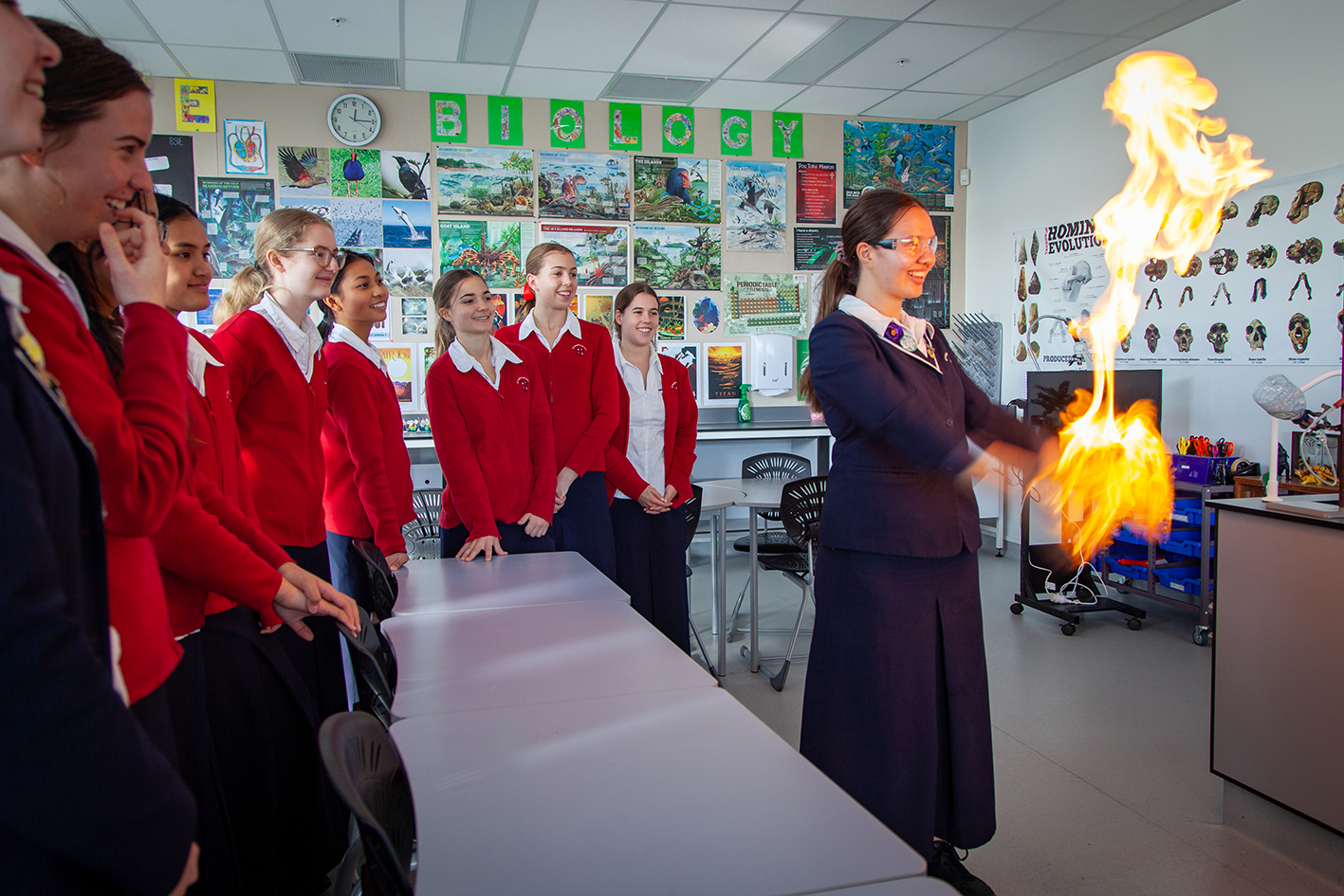
| Faculty Leader | tba |
| Teacher in Charge of Biology | Sandy Wong |
| Teacher in Charge of Chemistry | Bernice Judeel |
| Teacher in Charge of Physics | William McSweeney |
| Teachers | Leigh Bradbury-Taylor |
| Caroline Burke | |
| Lorraine Evening | |
| Jasmine Foote | |
| Jarafshan Mistry | |
| Kolotita Taimani | |
| Jane Trounson | |
| Sandy Wong | |
| Laboratory Manager | David Stevenson |
Science
Science is taught as a combined subject at Level 1 and comprises studying aspects of Biology, Chemistry, Physics and Earth Science to lay a broad foundation before specialising at Level 2. We offer an external based program catering to students wishing to study ther specialist Sciences at Level 2 and a more internal-based program catering to students for whom this mode of learning is better suited to them.
Biology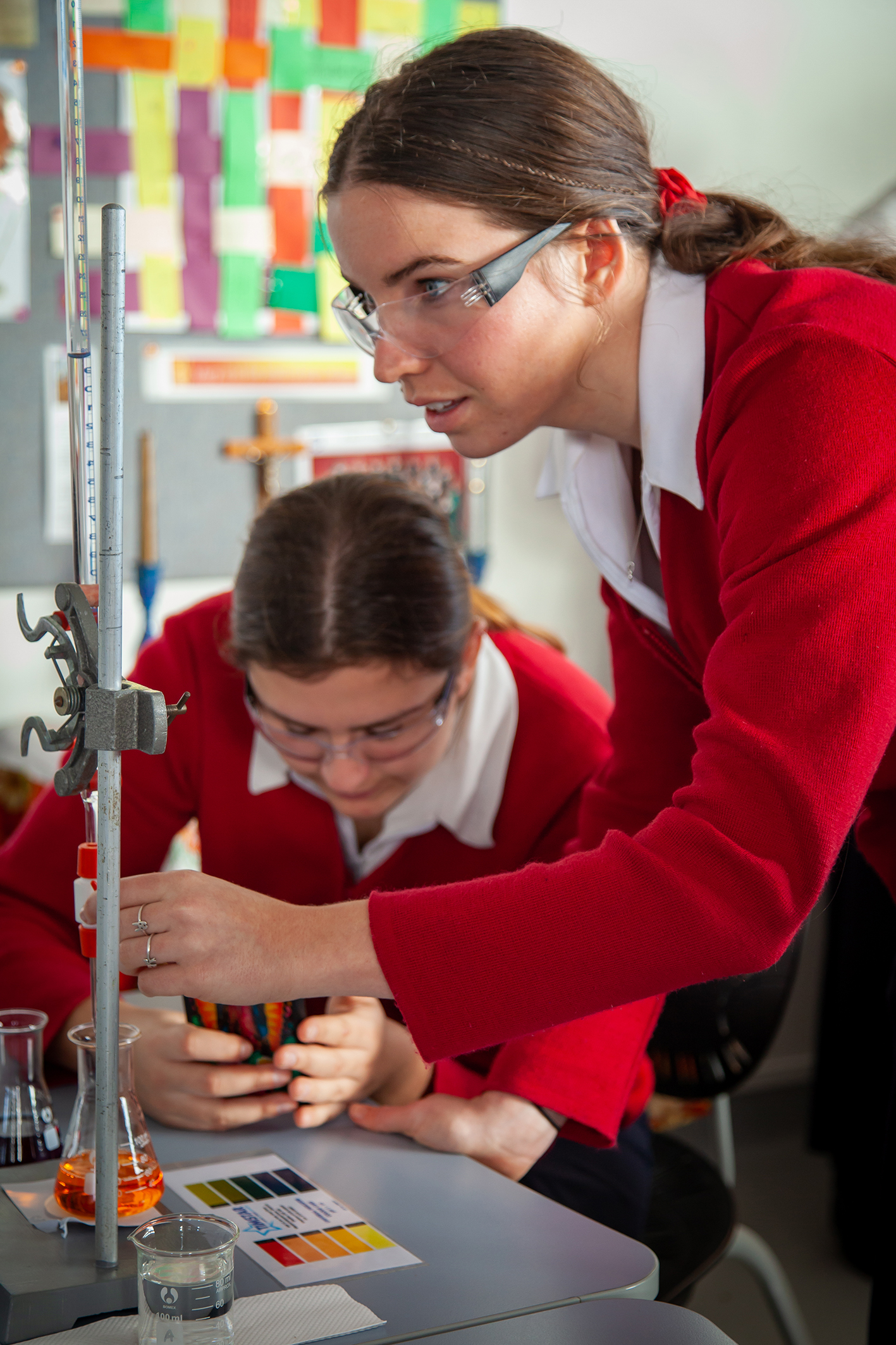
Students choosing to enrol in the Biology course will be given an introduction into the fundamentals of Genetics, Evolution, and Cell Biology. They will also investigate animal and plant adaptations, and responses to stimulus from the environment. In addition, each student will also be given the opportunity to develop their research skills and will be challenged to critically evaluate Biological information presented in the media. Achievement in Level 2 Biology is a necessary prerequisite for Level 3 Biology.
Chemistry
Senior Chemistry students will learn about the nature and behaviour of matter. They will learn important skills relating to quantitative analysis and will be taught the key concepts relating to atomic structure and bonding. The fundamentals of thermochemistry and equilibrium are covered in the senior course alongside a programme to develop students understanding of reduction and oxidation as well as organic chemistry. Achievement in Level 2 Chemistry is a necessary prerequisite for Level 3 Chemistry.
Physics
Studying Physics in the senior school will allow students to explore and develop an understanding of the fundamental concepts of mechanics, waves, electricity and magnetism that give insight to how the physical world around us works. Students are also given opportunities to carry out their own investigations and taught how to analyse the mathematical relationships shown in their results. Achievement in Level 2 Physics is a necessary prerequisite for Level 3 Physics.
Scholarship
A Scholarship preparation program is available for students interested in sitting Scholarship Biology, Chemistry and Physics and is co-ordinated by the Faculty Leader and respective subject heads. Students may join the program at Level 2 in consultation with the Faculty Leader.
Competitions / External Programs
Junior students partake in the The Royal Society Te Aparāngi CREST program along with entering the NIWA Auckland Science Fair if they choose. We offer a tutorial program for students wishing to be selected for the International Biology, Chemistry and Physics Olympiads as well as the NZ Young Physicist’s Tournament. In addition, there are many opportunities for students to enter a multitude of Science competitions and they are advertised to all students digitally and on noticeboards in labs.
We welcome your daughter to discover the world and universe around her in a 21st century mercy setting.
Religious Education Staff
| Director of Special Character | Connie Fraser |
| Faculty Leader for Religious Education | Janet Williams |
| Assistant Faculty Leader | |
| Teachers | Avagail Café |
| IndiaRose Cunningham | |
| Bill Hooper | |
| Holly Jarvis | |
| Clare McGivern | |
| Chloe Mines | |
| Dora Salesa | |
| Melissa Spragg | |
| Lynne Tanner | |
| Samantha van der Merwe |
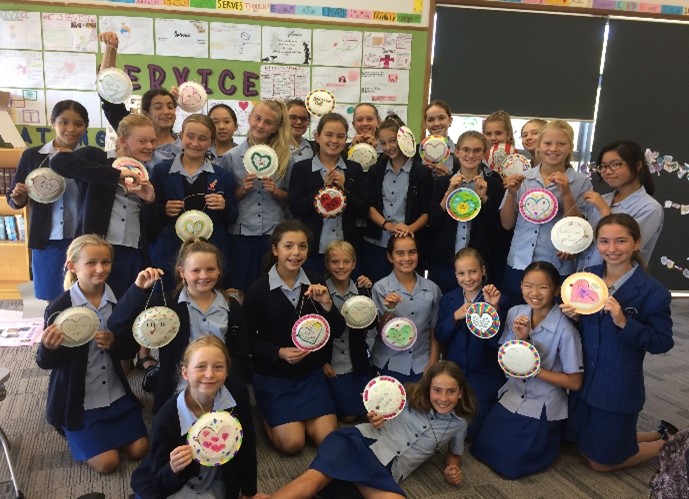 |
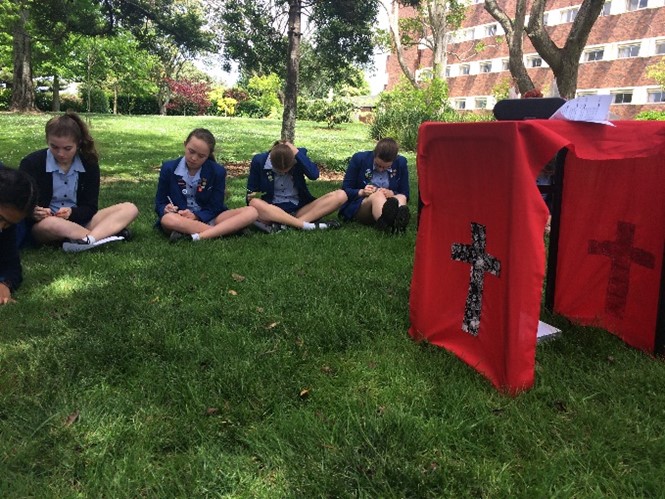 |
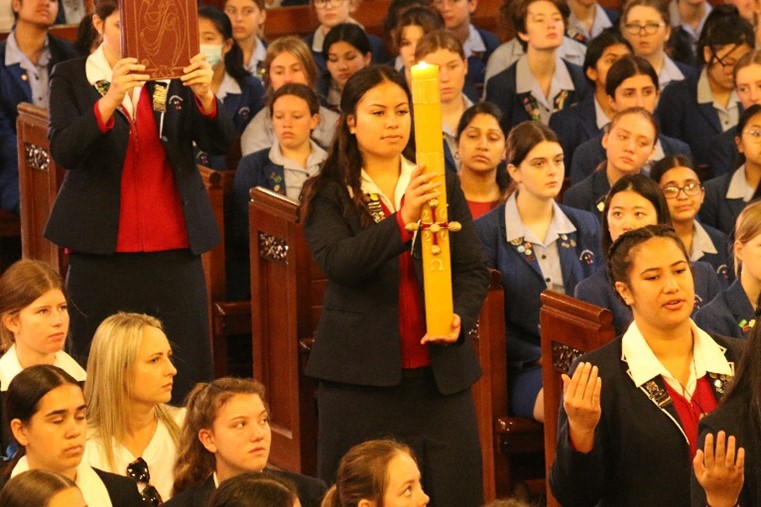 |
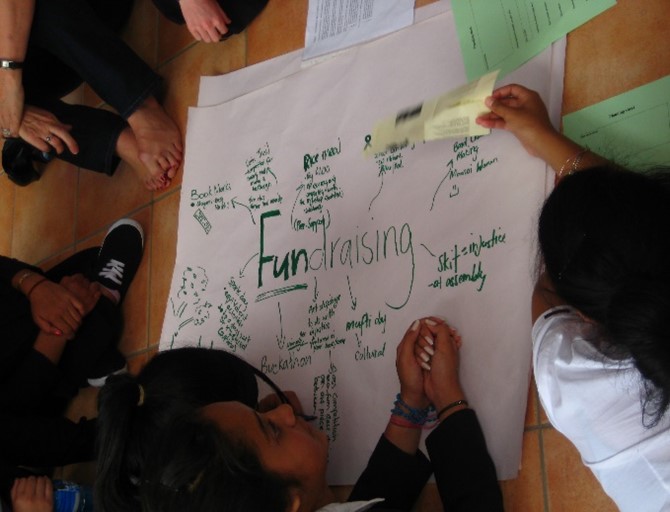 |
Fanning the flames of faith
The Faculty of Religious Education is a vibrant and engaging community of learners. Our mission is to ignite and fan the flames of faith and to educate students in a wide range of dimensions of the Catholic Church. All students at St Mary’s College take part in Religious Education classes, all of which are taught by specialist Theology teachers.
Modern resources, in-depth study
As a student at St Mary’s College following the Understanding Faith curriculum and new RE Curriculum: Tō Tātou Whakapono Our Faith, you will be educated in Church teachings, aspects of worship, liturgy and experience, Church history, and Christian ethics. Teaching is based on the Authority of the Church through Scripture, Tradition and Magisterial documents. Resources are up-to-date and all programmes, except Year 7, are digitally integrated.
Credits for NCEA, University Entrance approved
At Year12 and Year13 students complete 3 x NZQA 6 Credit Internal Achievement Standards. Students can achieve Religious Education with Endorsement. Some Level 3 RE Assessments are worth 6 Reading Literacy credits. Religious Education is an approved subject and can be used for University Entrance. Each senior level begins with a Mercy Value focus. In 2025 St Mary’s College will continue to implement the new Level 1 Religious Studies Achievement Standards. This will comprise two 5 credit Internal Assessments and a 5 credit External Assessment.

